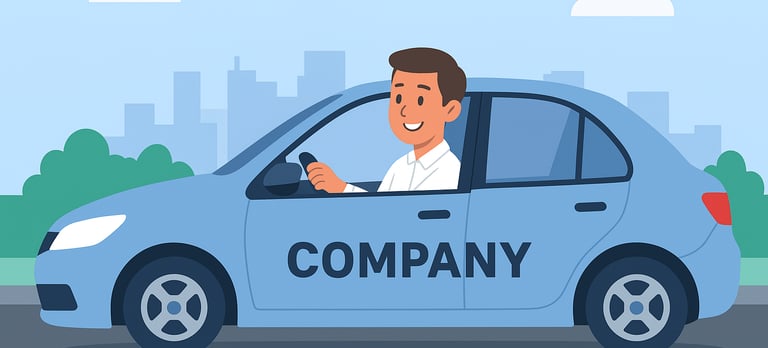When Does Home-to-Work Travel Trigger FBT?
Employer-Provided Vehicles: When Does FBT Apply to Home-Work Trips?



Employer-Provided Vehicles: When Does FBT Apply to Home-Work Trips?
If your business provides vehicles for employees to travel between home and work, it's important to know when those journeys count as a Fringe Benefit and attract Fringe Benefit Tax (FBT) in New Zealand.
What Is a Fringe Benefit in This Context?
A fringe benefit occurs when:
An employer makes a motor vehicle available for an employee’s private use.
That use includes travel between home and work (unless specifically excluded).
Every employer-provided, privately used home-to-work travel generally triggers FBT, unless an exception applies.
Four Key Exceptions (From Case Law)
FBT does not apply when the vehicle is necessary due to the nature of the employee’s work:
They need to carry essential, bulky, sensitive, or high-value equipment between home and work.
Their work is itinerant — they travel to varying and unpredictable workplaces throughout the day.
They respond to emergency calls from home, and responsibility begins before they leave.
Their home serves as an actual workplace or base of operations.
When one exception applies, the journey is treated as work travel, not private use.
Incidental vs. Minor & Insignificant Use
Incidental Private Use
If a private benefit (like a quick stop for lunch) doesn’t add extra distance, then it’s incidental and doesn’t trigger FBT.Minor or Insignificant Private Use
If the detour is very small—under ~5% of the total journey and under ~2 km—it may be disregarded.
Availability for Private Use: A Risk Factor
Even if the exceptions seem to apply, FBT can still arise if the vehicle is otherwise made available for private use on the same day—unless the private use is minor or legally excluded. Employers must ensure the vehicle isn’t available outside work needs or properly document restrictions.
Practical Guidance for Employers
To effectively manage FBT risk related to employee travel, employers should:
Assess employee roles carefully to determine whether exceptions apply, particularly for itinerant roles or employees carrying essential equipment.
Maintain comprehensive documentation such as role descriptions, on-call schedules, and records demonstrating the nature of travel.
Implement and enforce clear policies prohibiting private use where appropriate.
Monitor vehicle use closely, recognising that any private use during the day (absent an exclusion) can trigger FBT.
Consider the specific rules for shareholder-employees, including the potential application of subpart DE for close companies.
